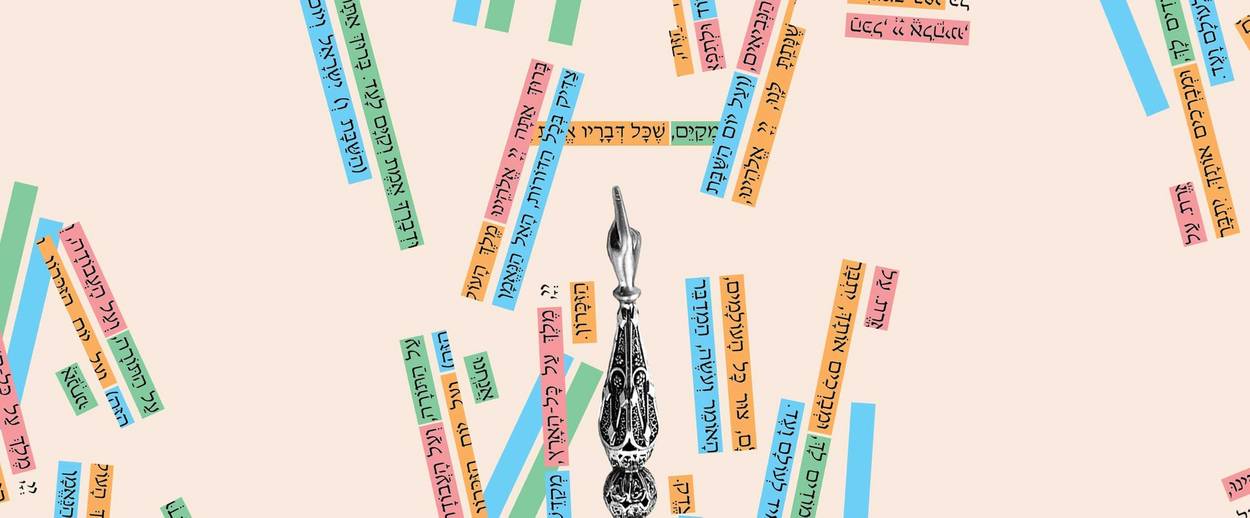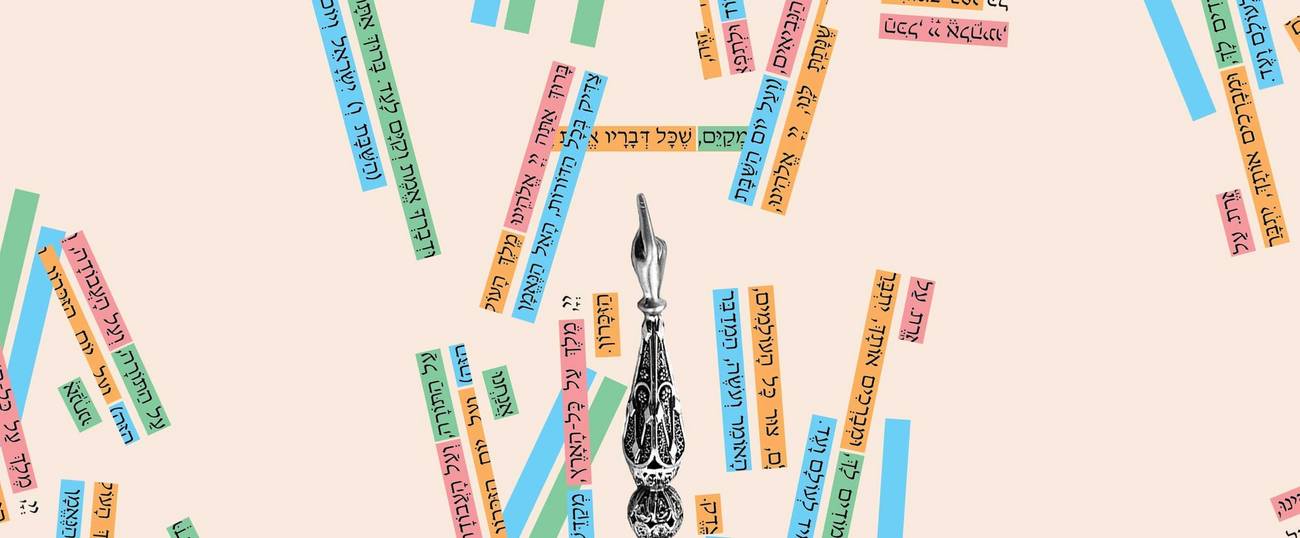My Second Bat Mitzvah
I’m not afraid of the bullies anymore




I had my bat mitzvah on Oct. 9, 1987, the second day of Sukkot—on a Friday morning. Unlike my younger brother, who protested that he was a secular humanist every time my parents told him to study Torah, I was not opposed on principle to having a bat mitzvah; I just didn’t want any of my peers to see it. Once we turned 12, we were required to attend Shabbat services every week, so if I’d had it on a Saturday morning, there was a high chance of a classmate sitting in the sanctuary. Friday morning, on the second day of Sukkot, none of them were present.
In middle school I was a social outcast, the bottom rung of the social ladder. I was a sturdy, intense girl, with thick, tangled dark hair that I couldn’t seem to brush, and I had a penchant for wearing anything but pants: In the winter I often wore flowered shorts and legwarmers pulled over my knees, long before that might have been considered cool. I was a straight-A student, and the teachers liked me, but when we changed classes, kids would bark at me in the hallways. Ruff-Ruff-Rosie!
Every morning in homeroom, the girl who sat behind me would punch me, hard, in the back of the head. Every afternoon, I was pushed down into the aisle of the school bus, because dogs didn’t deserve seats, hands holding me down on the floor as the bus hummed and turned. Every day was a refrain of “Rosie has no friends!”
And in the midst of this turmoil was my bat mitzvah. No, I didn’t want these kids to watch me “come of age.”
My haftarah, the supplemental reading from one of the books of the prophets, was from 1 Kings 8, which detailed King Solomon’s dedication of the brand-new Temple, and his blessing of the congregation of Israel. The cantor who taught haftarah was a red-haired, bespectacled guy who seemed perpetually on edge. I suppose teaching 12-year-olds to chant ancient Hebrew can’t be an easy job, and I was probably even more difficult than the other kids he tutored: Even though I’d carpooled to Hebrew school at my Conservative synagogue outside Philadelphia three times a week since preschool, I’d somehow failed to learn Hebrew.
The cantor was already resigned to the fact that I couldn’t read Hebrew, and he immediately began teaching me my haftarah by painstakingly handwriting transliteration over each word and then writing the number of syllables for the chant, along with an arrow for whether I should go up or down with my voice.
The bat mitzvah day came. The service on the second day of Sukkot was generally held in the much smaller chapel, but at my bat mitzvah, the large sanctuary was packed. I am the oldest grandchild on both sides, my mother’s family is huge, and my grandmother insisted on inviting all her friends and her family from Detroit. I have a vague memory of chanting two Torah portions, duly memorized, plus the maftir, and the haftarah with its accompanying blessings. I remember the surprise of hearing my own voice in the sanctuary. There was a kiddush afterward in the sukkah, followed by a party at my parents’ house, a band in the backyard, kosher caterer in the garage, a chocolate-chip cake shaped like a Torah. I hadn’t wanted a party. Friends of my parents and relatives I didn’t know kept handing me envelopes, and I just wanted to escape. I mostly spent the party hiding in the living room and upstairs in my bedroom, the conversations floating up from below.
A year later, I fell in love with musical theater, seduced by my high school’s production of Man of La Mancha. Although I was a lowly freshman, and the role was out of reach, I was deeply affected by the character of Aldonza, the jaded kitchen whore who is redeemed by Don Quixote, who imagines her as a beautiful lady and bestows upon her his ideal of an impossible dream. I may have been in the chorus, but I no longer cared what anyone thought of me—I was onstage and therefore powerful and untouchable. And actors are an accepting, friendly bunch. The bullying stopped.
After that production, theater became my religion. I swapped Jewish summer camp for theater camp, went to training programs and took voice lessons. Study the text, find the music—the clues were in there. I was a theater major at Barnard, and after I graduated, I spent my days auditioning in midtown with my binder of 16-bar selections, up-tempos and ballads, or downtown with my two contrasting monologues, both Shakespeare and contemporary. I toured the U.S. doing children’s musicals for schools, I did Macbeth in a Lower East Side parking lot, various film projects, and routine extra work on a soap opera. And I did all of it while supporting myself with a day job as an administrative assistant.
When I got married, I was under no illusion that I would find financial security with an oft-unemployed graphic designer. But after all, marriage is the highest form of social achievement—now I had a friend for life! He was clever and funny and could be disarmingly sweet, and I hoped that the sudden distance and unkindness he showed me during our engagement was just a symptom of pre-wedding jitters. When you stand under a chuppah and promise yourself to your beloved with vows borrowed from Shakespeare and Rodgers and Hart, you aren’t thinking about the demise of the marriage.
We had three children together, and for 12 years I was a stay-at-home mom, because how could I continue to audition without someone to watch my kids? And what would have been the point of returning to a day job? But as the acting work and lessons and classes fell away, I found myself in a great tunnel of white noise, with nothing much mattering to me besides the day-to-day goings-on of the kids.
I was an occasional synagogue-goer for most of my adult life—the High Holidays, Simchat Torah and Purim for the kids, and sometimes a Friday night, if there was a family dinner served afterward. It was my son Asher’s bar mitzvah this past Memorial Day weekend that pushed me reluctantly back into Saturday morning synagogue attendance late last winter. I tiptoed guiltily into the back of the sanctuary. Originally, I went to scope out the catering options at the kiddush, but I very quickly became invested in the sound of the liturgy. The words of my childhood, in a language I couldn’t understand, in a prayer book I couldn’t follow, were comforting to me in the wake of a prolonged, scorched-earth divorce.
Our cantor was going to be out of town for Asher’s big day, so I ended up leading the bar mitzvah service. I met with the cantor for weeks beforehand, learning the Mincha service—which she gave me in transliteration, since I still couldn’t read Hebrew. I was an efficient learner—it was one more production, after all—but I was simultaneously struck by the power of Etz Chayim, by the idea of returning to a God who could renew life. I sang the prayer in the shower, under my breath on the way to work.
Asher, after some reluctance to study, ultimately read beautifully from the Torah. Because we had the ceremony in the afternoon, there was no haftarah.
A few weeks later, in June, I received my get, my Jewish divorce, from the rabbi, and took three symbolic steps forward into the rest of my life. Afterward, my friends took me to a sidewalk restaurant to celebrate my divorce with a drink—I was unbound.
Something about learning the liturgy for Asher’s bar mitzvah made me want to relearn my own bat mitzvah portion. Vitally. Inexorably. Enough to make me want to finally learn Hebrew. So I started watching YouTube tutorials for the aleph-bet, using Duolingo, and watching hours of video classes for biblical Hebrew. Slowly, I began to be able to read words, to follow the service, discovering along the way that to my surprise, I’d had the foundations to read Hebrew all along; I’d just never actually gotten off the ground.
On my first read-through of the haftarah passage, I gave up—I remembered bits of the first paragraph, some words in the second. Otherwise, it was as if I’d never seen it before. My second reading took more than half an hour. Now I read it over and over again, for fluency. Every night, in the heat of summer, after the kids are asleep, I tell the story of Solomon’s dedication of the Temple.
No one predicted the destruction of the Temple at its dedication. This is the recounting of the very beginning of a Temple: Feel the weight of the Ark as it is carried through the streets. Enfold yourself in the wings of the cherubim who encircle the Ark when it is set down in the sanctuary. Listen to King Solomon’s triumphant announcement—I have built it! The Temple is finally ready! There is celebration and there is hope.
I practice singing the trop, 40 patterns of cantillation for chanting haftarah. I follow the recording of the cantor’s voice. I’m now acquainted with the wily shape-shifting munach, the smooth glissando of a pazer. A segol will answer the call of a zarka.
Study the text, find the music—the clues are in there. When I’m able to put them together, there will be a story in song. I am learning haftarah correctly this time. I am connecting with my past and with my people.
On Tuesday morning, Sept. 25, on the second day of Sukkot, on the day before my 44th birthday, I will read my bat mitzvah haftarah for the first time in 31 years, in front of the members of the congregation of my synagogue. This is how I am choosing to mark the coming of this new age.
I’m not sure who will be there, and it’s a strange thing to invite friends to something that isn’t a performance. At least this time, though, I won’t fear the bullies. So call me by my Hebrew name—I will come forward.
Roseanne Benjamin is a freelance writer in Manhattan.